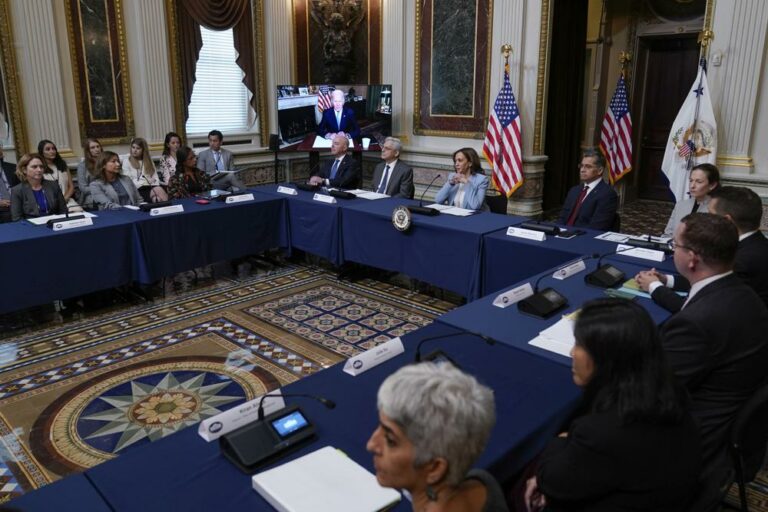Democrats displayed a newfound sense of optimism about the election-year political climate Wednesday after voters in traditionally conservative Kansas overwhelmingly backed a measure protecting abortion rights.
At the White House, President Joe Biden hailed the vote in Kansas as the direct result of outrage at the Supreme Court’s decision in June to repeal a woman’s constitutional right to obtain an abortion.
Republicans and the high court “don’t have a clue about the power of American women,” Biden said. “Last night in Kansas, they found out.”
On Capitol Hill, Senate Majority Leader Chuck Schumer, D-N.Y., boasted of the political winds “blowing at Democrats.”
“Last night in the American heartland, the people of Kansas sent an unmistakable message to the Republican extremists,” he said. “If it’s gong to happen in Kansas, it’s going to happen in a whole lot of states.”
With three months until the November election, the optimism may be premature. But it represents a much-needed break for a party that has spent the better part of the past year reeling from crisis to crisis, including the botched withdrawal from Afghanistan and rising prices for gasoline and other goods. Those developments have contributed to Biden’s low approval ratings, leaving Democrats without a unifying leader in a position to rally voters before the election, with control of Congress at stake.
The Kansas vote, however, suggests that threats to abortion rights may energize Democrats in a way few political leaders can. And it comes at a moment when the party is gaining momentum on other fronts, including a legislative package to reduce prescription drug prices, combat climate change and raise taxes on corporations.
The challenge for Democrats will be to maintain the energy for several more months and defy trends that typically trip up the party in power.
In recent history, the party controlling the White House almost always suffers deep losses in the first midterm election of a new presidency. Also, an overwhelming majority of voters believe the country is headed in the wrong direction amid inflation and other economic concerns.
Even with abortion-related momentum, many Democratic strategists privately expect to lose the House majority and believe the Senate is essentially a coin flip.
The day after the Kansas vote, Democratic strategists on the front lines of key midterm contests described a complicated political reality on abortion.
Abortion rights supporters surged to the polls in Kansas, where abortion was quite literally on the ballot. By a roughly 20-percentage point margin, they rejected a measure that would have changed the state constitution to allow state lawmakers to impose restrictions on abortion — or even a ban. The early August primary turnout was on par with a governor’s general election contest.
But few elections this fall will feature such clear stakes for abortion rights. Just four states — California, Michigan, Vermont and Kentucky — are expected to feature a Kansas-style abortion referendum on the November ballot, according to the pro-Democratic group EMILY’s List.
In the majority of states, Democrats must convince voters they can protect abortion access only by defeating anti-abortion Republican candidates at the state and federal level. While that is true in most cases, it’s much more complicated to run against a candidate than a single-issue ballot measure, according to Democratic pollster Molly Murphy.
“The optimist would say, when voters know that abortion is on the ballot, they are motivated to turn out,” Murphy said. “That’s the messaging challenge that we are going to face. Will voters believe that a legal right to abortion is at stake here in this country in their vote for Congress, Senate, governor, state house — all of those things — and be as motivated to show up to vote?”
“Republicans are going to do everything they can to deflect and not engage on this,” she added, noting the GOP’s heavy focus on inflation, gas prices and immigration.
Indeed, as Democrats celebrated on Wednesday, the Republican reaction to the abortion vote was decidedly muted.
The Kansas vote was “a huge disappointment for pro-life Kansans and Americans nationwide,” said Mallory Carroll, of Susan B. Anthony Pro-Life America.
Republican strategist Christine Matthews warned that the Kansas vote could have “an energizing effect for abortion rights supporters.”
“Success breeds success,” she said. “It will encourage the belief that turning out and activating can make a difference and that is particularly important with younger voters and those less inclined to participate. It’s a momentum-shifter.”
Democrats have long tried without much success to energize supporters by focusing on abortion. But the Supreme Court’s decision clarified the stakes as never before. Absent a new federal law, abortion rights now fall to the states, and in 12 states led by Republicans, abortion has already been banned or heavily restricted. Many more are expected to follow.
Republican strategists acknowledge that swing state candidates will have to tread carefully on the issue.
In Georgia, GOP Senate nominee Herschel Walker, for example, worried some Washington Republicans by quickly declaring his opposition to abortion rights even in cases of rape, incest and the life of the mother. Such a position, thought to be extreme in past years, is somewhat common among Republican candidates in 2022.
Republicans in other states have largely sought to avoid clarifying their position.
The Senate Democrats campaign arm recently established a website, GOPOnAbortion.com, to highlight Republican candidates’ outspoken opposition to abortion rights. While Democratic candidates from New York to Washington state are already running ads on abortion, the issue is expected to play a bigger role in some races than others.
Michigan Sen. Gary Peters, who leads the group dedicated to protecting the Senate’s Democratic majority, predicted that abortion would likely matter most as a political issue in Senate races in Nevada, New Hampshire and Arizona — all states in which polling suggests strong support for abortion rights. Suburban women and younger voters are most likely to be motivated by the issue.
“There’s a great deal of anger,” Peters said of the backlash against the Roe reversal. “There’s an energy I haven’t seen before.”
The Kansas vote suggests that such energy could extend well beyond a handful of states.
Polling shows that relatively few Americans wanted to see Roe overturned.
More Americans disapprove than approve of the Supreme Court’s decision to overturn Roe v. Wade, 53% to 30%, according to an Associated Press-NORC Center for Public Affairs Research poll from July conducted about three weeks after the ruling. Just over half of those surveyed said they felt angry or sad about the ruling, the poll found.
In Wisconsin, the leading Democratic Senate candidate, Lt. Gov. Mandela Barnes, noted that the day the Supreme Court overturned Roe was the biggest fundraising day of his entire campaign.
“People are motivated and energetic in ways that I’ve never seen before,” he said in an interview. “I can only assume that that intensity will increase all the way to November.”
(AP)












4 Responses
“hope for Democrats”: ONLY if the Republicans advocate banning abortion to save the mother’s life, or trying to ban contraceptives (including the “morning after” pill which interferes with conception before the baby clearly exists). Polling has consistently shown support for severely limiting abortion of viable or close-to viable babies (something that the Democrats have found unobjectionable) or for not prosecuting those whose attacks on the mother kill the baby. If you supported a rule that said no restrictions prior to first heartbeat, and no abortions other to save the mother once the baby is viable, you would have support from most Americans (and conversely, anyone arguing for more, or less, rules on abortion risks alienating many voters).
This vote was a hoax. The question posed to the voters was unclear and misleading. This caused many voters who were coming to vote against abortion, to inadvertently vote for it. This has The Liberal Manipulation Machine fingerprints all over it. This is a carefully planned subterfuge being rolled out as a liberal response to their losses in the Supreme Court. It follows the usual liberal Modus Operandi: If you can’t win, cheat.
The Republican-controlled Legislature, which put the measure on the ballot, didn’t make it easy. It was confusing: “Yes” meant you didn’t support a right to abortion in the constitution. “No” meant you did support that right. The timing was challenging because the vote was held along with the state primary election. Since almost a third of Kansans are not affiliated with a party and there are few contested Democratic seats, many voters sit out the primaries.
Not this time. Voters turned out en masse and handed a stunning rebuke to the antiabortion legislators. With more than 95% of the vote reported Wednesday, the results were 58.8% to 41.2%. It took a lot of advocates on the ground in Kansas assembling a broad coalition to achieve a victory to protect constitutional rights. Their efforts resonated with liberals, moderates and conservatives. In fact, they couldn’t have gotten the win without reaching people from a variety of political backgrounds, including moderate Republicans and others who may not want to see a constitutional right to choose blocked.
What idiot drafted that amendment? It’s very confusing and overly complicated. All it had to say was one thing: “Nothing in this constitution shall be construed as protecting a purported right to abortion”. That is all.
There is no “right” to murder your child hiding somewhere inside the Kansas state constitution for decades, where nobody noticed it until a year or two ago. The judges who pretended to discover such a “right” were simply lying. They didn’t honestly believe the right was there, they just corruptly used their power to declare it so, even though they knew it wasn’t. So the amendment should just have reversed that. It shouldn’t have mentioned rape, incest, or the mother’s life. Just “no right to abortion”; what exceptions should be made should be up to the legislature. Such an amendment could have passed